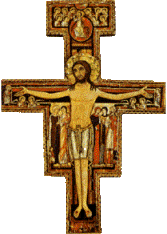The General Constitutions of the SFO has as its purpose, the application of the Rule of Life. Recently I had the pleasure of making a direct connection between the gospel reading of the day and a particular article I was pondering. What a joy.
… [Secular Franciscans] discover in [Christ, poor and crucified] the value of contradictions for the sake of justice and the meaning of the difficulties and the crosses of daily life. With Him they can accept the will of the Father even under the most difficult circumstances and live the Franciscan spirit of peace, rejecting every doctrine contrary to human dignity. (SFO General Constitution, Article 10)
Notice how this article is embodied in the following Gospel passage (Mk 3:1-6).
Jesus entered the synagogue. There was a man there who had a withered hand. They watched Jesus closely to see if he would cure him on the Sabbath so that they might accuse him. He said to the man with the withered hand, "Come up here before us." Then he said to the Pharisees, "Is it lawful to do good on the Sabbath rather than to do evil, to save life rather than to destroy it?" But they remained silent. Looking round at them with anger and grieved at their hardness of heart, Jesus said to the man, "Stretch out your hand." He stretched it out and his hand was restored. The Pharisees went out and immediately took counsel with the Herodians against him to put him to death.
Jesus is prophesized to be 'a sign that is contradicted' by the world [Luke 2:34]. A contradiction can be viewed as an opposing statement. When we speak of someone becoming 'a sign that is contradicted' we mean an individual who contests the accepted thinking and pays a price for his or her stand. Wherever the Church insists on justice and human dignity over degrading circumstances it too becomes 'a sign of contradiction', and it is 'spoken against' (i.e. resisted), even violently, by those who seek to marginalize its voice and minimize its demand.
The wisdom of the world tries to seduce us into dropping our mantle of contradiction and so we too often fail our responsibility to fight injustice. Most often we just can't put our (withered) finger on exactly what is the problem because we've grown accustomed to following twisted rules created for promoting self interests. But as the gospel passage shows, even well intentioned rules (including religious rules) can interfere with God's plan to reach out to his beloved children and offer healing and salvation.
This is not a small problem. It's the curse of legalism where the letter of the law opposes the spirit of the law. So many of our attempts to solve social problems end up in these horrifying paradoxes; where we reap unintended consequences. These consequences are frustrating and often difficult and painful and are suffered unevenly. The Church, even if it doesn't own perfect solutions, nevertheless acts as a 'sign of contradiction'; opposing dark outcomes and continually casting light into shadowy areas.
We don't relish our duty to confront injustice because of the pain involved. Yet we're called to this role for the sake of the gospel and we must carry these crosses and count them as holy because they counter the attacks on 'God's will for his children'. This is the basis for human dignity. It's not difficult to see that this is what Jesus was doing when he carried out the will of his Heavenly Father by healing on the Sabbath, and in doing so opposed the heartless thinking of the Pharisees at a terrible cost. 'They went out immediately and took counsel to put him to death.'
This same 'opposition' is an integral step in our own mission; 'to build a more fraternal and evangelical world so that the kingdom of God may be brought about more effectively' (SFO Rule, Art. 14). Unfortunately, being 'spoken against' is difficult and painful. We can expect to be ridiculed and persecuted for promoting causes that are 'signs of contradiction'. If they have persecuted me, they will persecute you also. (Jn. 15:20) But this is at the very core of our call to be Gospel witnesses.






No comments:
Post a Comment